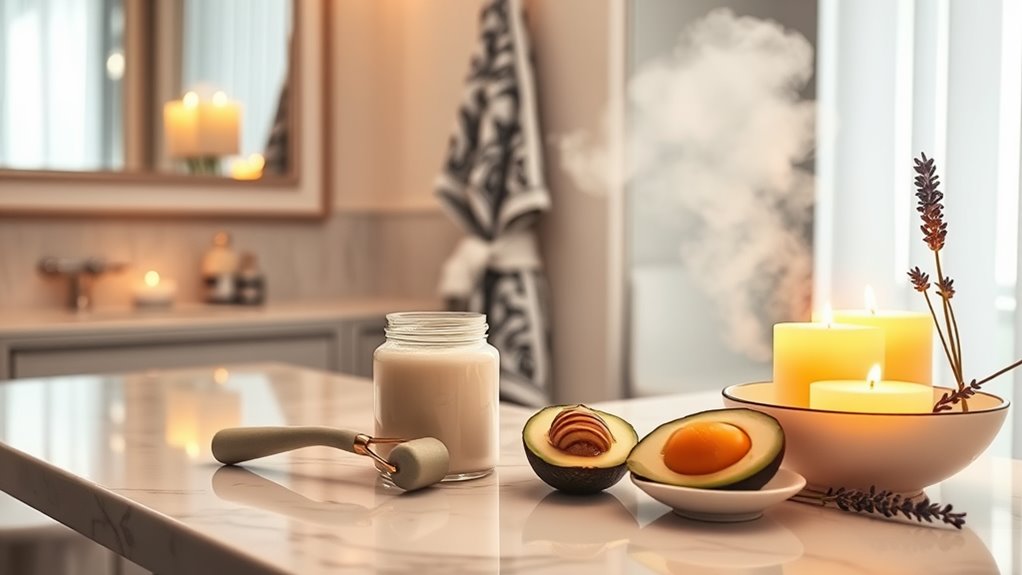What Dermatologists Do Every Night (And You Should Too)
Every night, dermatologists follow a consistent skincare routine to rejuvenate and repair their skin while they sleep. Start with a thorough cleansing to remove dirt, oil, and makeup. Exfoliate to slough away dead skin cells, then use targeted treatments for specific concerns like acne or fine lines. Lock in moisture with a hydrating essence and a rich night cream or serum. These steps enhance repair and renewal. Discover more about each step for optimal results.
Cleansing: The Foundation of Nighttime Skincare
When you end your day, taking a few minutes to cleanse your skin isn’t just a routine; it’s an essential step in your nighttime skincare regimen.
This process removes dirt, oil, and makeup, allowing your skin to breathe and regenerate overnight. Additionally, finding the optimal face-washing frequency based on your skin type can enhance the effectiveness of your cleansing routine.
Exfoliating: Sloughing Away the Day
While you might think cleansing alone is sufficient for your skin each night, exfoliating plays a crucial role in removing dead skin cells and promoting cell turnover. Regular exfoliation reveals a brighter complexion and enhances product absorption. Here’s a quick comparison of exfoliation types:
| Exfoliation Type | Benefits |
|---|---|
| Physical | Immediate texture improvement |
| Chemical | Deep penetration and even skin tone |
| Enzymatic | Gentle, ideal for sensitive skin |
Choosing the right exfoliator based on your skin type can enhance the benefits of your skincare routine.
Targeted Treatments: Addressing Specific Skin Concerns
To effectively address specific skin concerns, incorporating targeted treatments into your nightly skincare routine is essential.
Use serums or creams that focus on issues like acne, hyperpigmentation, or fine lines. Apply these products directly to affected areas after cleansing and exfoliating.
Always follow the manufacturer’s instructions for optimal results, and allow time for your skin to adjust to new treatments. Incorporating ingredients with proven acne control properties can significantly enhance the effectiveness of your routine.
Hydration: Locking in Moisture Overnight
Hydration plays a crucial role in maintaining healthy skin, especially during nighttime when your skin enters repair mode.
To effectively lock in moisture, consider these steps:
- Use a gentle cleanser in the evening.
- Apply a hydrating essence or toner.
- Choose a rich moisturizer for overnight use.
- Drink enough water throughout the day.
Additionally, incorporating winter skin hydration techniques can further enhance your skin’s ability to retain moisture during the colder months.
These practices ensure your skin stays supple and resilient.
Night Creams and Serums: The Power of Repair
When you focus on using the right night creams and serums, you harness the power of repair your skin needs overnight.
These products typically contain active ingredients like retinol, peptides, and antioxidants that promote cell turnover, reduce fine lines, and enhance elasticity. Retinol is a powerful ingredient that has been shown to significantly improve skin texture and reduce signs of aging by stimulating collagen production.
Applying them consistently can lead to significant improvements in your skin’s texture and tone by morning, ensuring a revitalized appearance.
Creating a Relaxing Nighttime Routine
Creating a calming nighttime routine enhances your skin’s repair process while promoting overall relaxation.
To establish this routine, incorporate these steps:
- Limit screen time one hour before bed
- Engage in soothing activities, like reading or meditating
- Use a gentle, hydrating skincare regimen
- Maintain a consistent sleep schedule
These practices help signal your body to unwind and prepare for restorative sleep. Additionally, effective skincare during the night can significantly boost your skin’s health and appearance.

